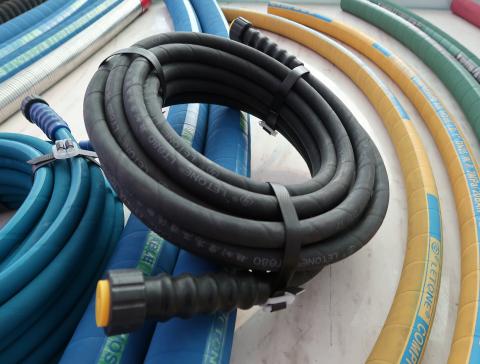In hydraulic systems, oil pipes are key components for conveying hydraulic power. Ensuring the safe operation of hydraulic oil pipe systems is an important measure to prevent accidents and extend equipment life. Here are some key steps on how to ensure the safety of hydraulic oil pipe systems through operating procedures:
Preparation before operation
System check
Before starting the hydraulic system, a comprehensive system inspection must be conducted. This includes checking for cracks, leaks, or loose joints in the oil pipes. At the same time, it should be ensured that all valves, pumps, and other control devices are in the correct position and there are no foreign objects obstructing their normal operation. In addition, it is necessary to check whether the oil level in the tank is appropriate and whether the oil is clean and free of impurities.
personnel training
Personnel operating hydraulic systems must receive professional training to understand the operating procedures, safety regulations, and maintenance requirements of the system. They should be familiar with various emergency response measures and able to use personal protective equipment correctly, such as helmets, protective goggles, and earplugs. Regular training and assessment can ensure that the skills and knowledge of operators are always at their best.
Environmental assessment
Before operating the hydraulic system, an assessment of the working environment should also be conducted. Ensure that the work area has sufficient lighting and ventilation for easy operation and heat dissipation. At the same time, obstacles that may cause slipping, tripping, or other accidents should be removed. For outdoor work, the impact of weather conditions on the operation should also be considered, and additional safety measures should be taken when necessary.
Precautions during operation
Pressure monitoring
Continuous monitoring of pressure is crucial during the operation of hydraulic systems. Excessive pressure may cause oil pipe rupture or joint leakage, while low pressure may affect system performance. Therefore, the reading of the pressure gauge should be checked regularly, and the appropriate pressure level should be maintained by adjusting the relief valve or other control devices. If abnormal pressure fluctuations are found, the machine should be stopped immediately to check the cause.
Leak detection
Even small leaks can lead to serious problems over time, including environmental pollution and fire risks. Therefore, operators should regularly inspect the oil pipes and joints for signs of leakage and promptly address any discovered leakage points. The use of specialized leak detection agents can help identify subtle leaks that are difficult to detect.
temperature control
The temperature of hydraulic oil has a significant impact on its performance. Overheated oil will reduce viscosity, leading to poor lubrication and aging of seals; However, supercooled oil will increase viscosity, making pumping difficult and increasing energy consumption. Therefore, it should be ensured that the hydraulic system has appropriate cooling and heating measures to maintain the oil operating within the recommended temperature range.
Maintenance after operation
Cleaning and maintenance
After each use, the hydraulic oil pipe should be cleaned to prevent the accumulation of dust, dirt, and other pollutants. This not only helps maintain the good appearance of the oil pipe, but also prevents corrosion and wear. For difficult to clean internal oil pipes, cleaning agents and high-pressure air can be used for blowing.
Regular replacement
Even if the hydraulic oil pipe appears to be in good condition, it should be replaced regularly according to the manufacturer's recommendations. This is because material fatigue and long-term use can lead to a gradual decline in tubing performance. Regularly replacing oil pipes can prevent sudden failures caused by aging.
Record and analyze
Detailed records of maintaining hydraulic oil pipe systems are crucial for predicting future maintenance needs and optimizing maintenance plans. These records should include inspection dates, identified issues, measures taken, and information on any replaced components. By analyzing these data, we can better understand the wear patterns and causes of oil pipe failures, and thus develop more effective maintenance strategies.
In short, ensuring the safety of hydraulic oil pipe systems requires adherence to strict operating procedures. From preparation before operation to precautions during operation, and then to maintenance after operation, every step cannot be ignored. Through these detailed steps, the risk of accidents can be significantly reduced, the service life of equipment can be extended, and the continuity and efficiency of the production process can be ensured. Therefore, establishing a sound safety management system and operating standards is indispensable for any enterprise that relies on hydraulic systems.

